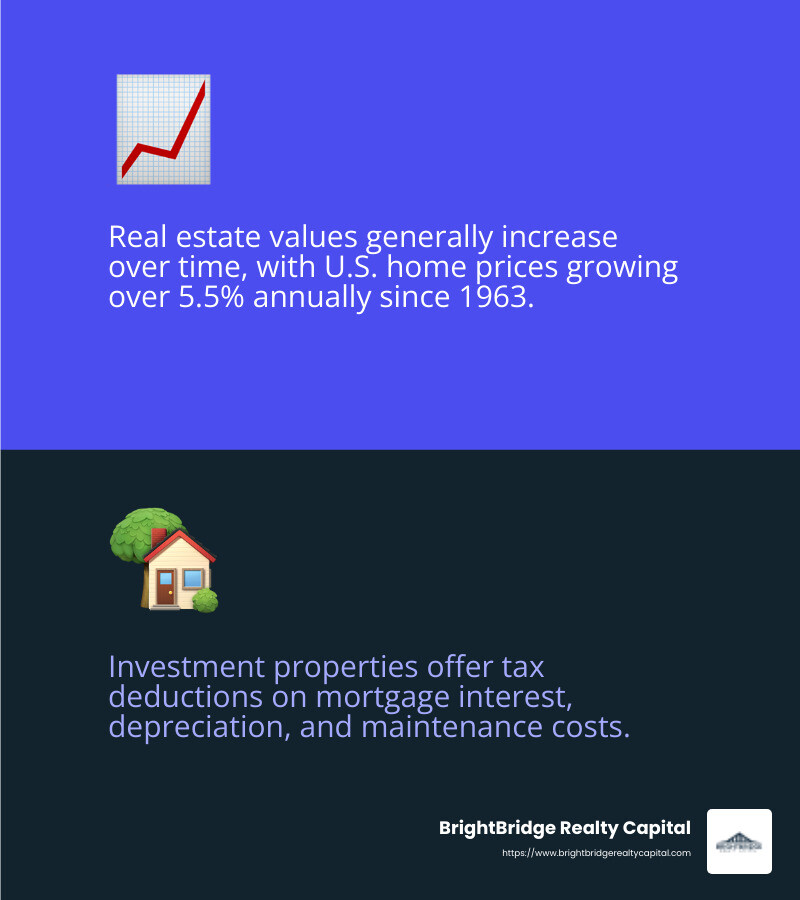Unlocking Real Estate: How Investor Loans Can Work for You

Investor loan real estate can be a game-changer for those looking to improve their financial portfolio through property investments. These loans offer a strategic path to acquiring investment properties, which can lead to:
- Steady passive income
- Potential property appreciation
- Portfolio diversification
Investing in real estate is one of the oldest wealth-building strategies. It not only provides a hedge against inflation but also offers potential for sustainable passive income. With the right investor loan, you can tap into a world of opportunities—whether you're looking to fix-and-flip or expand your rental portfolio. But navigating the landscape of real estate financing can be daunting, given the array of loan options and the specific requirements lenders impose.
At BrightBridge Realty Capital, we focus on helping investors secure the best financing solutions to maximize their returns. Understanding the types of loans available and how they can work for you is crucial in making informed investment decisions. Let's break it down.

Basic investor loan real estate glossary:
Understanding Investor Loan Real Estate
Types of Investor Loans
When it comes to investor loan real estate, understanding the different types of loans available is key. Each loan type has its own set of rules, benefits, and challenges. Here's a quick breakdown of the main types:
Conventional Loans: These are the most common for investment properties. They usually require a higher credit score and a larger down payment compared to loans for primary residences. Conventional loans follow guidelines set by Fannie Mae and Freddie Mac, making them a reliable choice for many investors.
Hard Money Loans: Ideal for short-term investments like flipping houses. They are easier to qualify for since they rely less on your credit score and more on the property's value. However, they come with higher interest rates and shorter terms, so they're best used when you plan to sell quickly.
Private Money Loans: These are loans from private individuals or companies. They offer flexibility and can be negotiated to fit specific needs. However, they can strain personal relationships if borrowed from friends or family, and terms can vary widely.
Each of these loans can help you secure income-generating properties, but it's important to choose the one that aligns with your investment strategy and financial situation.
Benefits of Investor Loans
Why consider an investment property loan? There are several compelling benefits:
Cash Flow: Investment properties can generate steady rental income. This cash flow can help cover mortgage payments and other expenses, potentially leading to profit over time.
Property Appreciation: Real estate values generally increase over time. Since 1963, home prices have grown by over 5.5% annually in the U.S., outpacing inflation. This appreciation can lead to significant financial gains when you sell.
Tax Benefits: Owning investment properties comes with tax perks. You can deduct mortgage interest, depreciation, and maintenance costs, reducing your taxable income. Plus, strategies like 1031 exchanges allow you to defer capital gains taxes by reinvesting in another property.

Understanding these benefits can help you make informed decisions about your real estate investments. With the right loan, you can leverage these advantages to build wealth and achieve your financial goals.
Navigating the Loan Application Process
Preparing Your Documentation
Getting an investor loan real estate can seem daunting, but preparing your documentation in advance can smooth the process. Let's break it down into simple steps.
Credit Score
Your credit score is crucial. Lenders want to see a score of at least 620, but a higher score can get you better terms. If your score is 740 or higher, you might qualify for the best rates. Improving your credit score before applying is a smart move. Pay down debts and avoid new credit inquiries.
Down Payment
Investment properties usually require a larger down payment than primary residences. Plan for at least 15% to 25%. A bigger down payment can lower your interest rate and monthly payments. Plus, it shows lenders you're serious and financially stable.
Cash Reserves
Lenders like to see that you have cash reserves. This means having enough savings to cover three to six months of mortgage payments. It reassures lenders that you can handle payments if unexpected expenses arise.
Tax Returns and Bank Statements
Lenders will ask for two years of tax returns and bank statements. These documents prove your income and financial stability. Make sure your tax returns are complete and accurate, and your bank statements reflect consistent savings and income.
Preapproval
Getting preapproved for a loan gives you a clear idea of how much you can borrow. It shows sellers you're a serious buyer. Preapproval involves a credit check and verification of your income and assets. It's more thorough than prequalification, which is just an estimate.
By organizing your documentation and understanding these requirements, you'll be better prepared to steer the loan application process. This preparation can help you secure the financing you need to invest in real estate confidently.
Financing Options for Real Estate Investors
Creative Financing Strategies
When it comes to investor loan real estate, traditional financing isn't the only game in town. There are several creative financing strategies that can help you secure the funds you need. Let's explore some of these options.
Home Equity Loans and HELOCs
If you already own a home, tapping into your home equity can be a great way to finance an investment property. A home equity loan gives you a lump sum at a fixed interest rate. On the other hand, a Home Equity Line of Credit (HELOC) works like a credit card, giving you a flexible line of credit to draw from as needed. Both options allow you to leverage your existing property to fund new investments.
Commercial Loans
For those looking to invest in larger properties, commercial loans might be the answer. These loans are typically used for properties with five or more units. While they come with stricter requirements, they can provide the capital needed for significant investments.
Seller Financing
In seller financing, the property seller acts as the lender, allowing you to make payments directly to them. This method can be beneficial if you don't qualify for traditional loans. However, have a solid legal agreement to protect both parties involved.
Crowdfunding
Crowdfunding allows multiple investors to pool their resources to fund real estate projects. This method provides access to larger investments with lower individual capital outlay. However, it involves complex management and regulatory challenges.
Bridge Loans
A bridge loan is a short-term financing option used to "bridge" the gap between buying a new property and selling an existing one. These loans are typically quick to arrange but come with higher interest rates. They're ideal for investors who need to act fast.
Each of these creative financing strategies offers unique benefits and challenges. Whether you're leveraging home equity, navigating commercial loans, or exploring seller financing, understanding your options is key to making informed investment decisions.
Frequently Asked Questions about Investor Loan Real Estate
Is it difficult to get an investor loan?
Securing an investor loan real estate can be more challenging than obtaining a loan for a primary residence. Lenders typically have stricter requirements, focusing heavily on your credit score and down payment.
Credit Score: A good credit score is crucial. Most lenders require a minimum score of 620, but having a score of 740 or higher can get you better rates and terms.
Down Payment: Expect to put down more than you would for a primary home. A down payment of 15% to 25% is common for investment properties.
Lender Requirements: Lenders also look at your debt-to-income ratio and cash reserves. They want to ensure you can handle the mortgage payments even if the property is vacant for a while.
What is the 2% rule in real estate investing?
The 2% rule is a guideline investors use to evaluate potential rental properties. It suggests that a property’s monthly rental income should be at least 2% of its purchase price to consider it a good investment.
ROI (Return on Investment): This rule helps in estimating the ROI. If the property meets the 2% rule, it’s likely to generate a positive cash flow.
Rental Income: For example, if you buy a property for $100,000, you should aim to charge at least $2,000 per month in rent.
Property Value: While the 2% rule is a helpful starting point, consider other factors like location, market trends, and property condition.
Can I use an FHA loan for investment properties?
The short answer is no, but there are exceptions. FHA loans are primarily for primary residences, but they can be used for multi-unit properties under certain conditions.
FHA Guidelines: FHA loans are designed to help individuals purchase homes they will live in. However, you can buy a property with up to four units using an FHA loan, provided you live in one of them.
Primary Residence: The key requirement is that the property must be your primary residence. This means you need to occupy one of the units.
Multi-Unit Properties: This strategy allows you to live in one unit while renting out the others, potentially covering your mortgage through rental income.
Navigating these rules and requirements is crucial for making smart investment decisions. Understanding the nuances of investor loan real estate can significantly impact your investment success.
Conclusion
When it comes to real estate investing, having the right partner can make all the difference. At BrightBridge Realty Capital, we specialize in providing customized real estate financing solutions that cater to your unique investment needs. Our focus is on offering fast closings and flexible funding, which means you can seize opportunities as they arise without delay.
Why Choose BrightBridge Realty Capital?
Fast Closings: We understand that time is crucial in real estate. That's why we pride ourselves on our ability to close deals quickly, often within a week. This speed allows you to stay competitive and capitalize on investment opportunities swiftly.
Customized Solutions: Every investor's strategy is different, and we recognize that. Our team works closely with you to tailor financing solutions that align with your specific goals and circumstances.
Competitive Rates: As a direct lender, we eliminate intermediaries, providing you with competitive rates that are hard to beat. This ensures you get the best possible deal for your investment.
By choosing BrightBridge Realty Capital, you gain a partner committed to helping you achieve your investment goals with confidence and ease. Whether you're looking to expand your rental portfolio, engage in fix-and-flip projects, or explore other real estate opportunities, we are here to support you every step of the way.
Ready to open up the potential of your real estate investments? Explore our loan options and see how we can help you bridge the gap to success.


